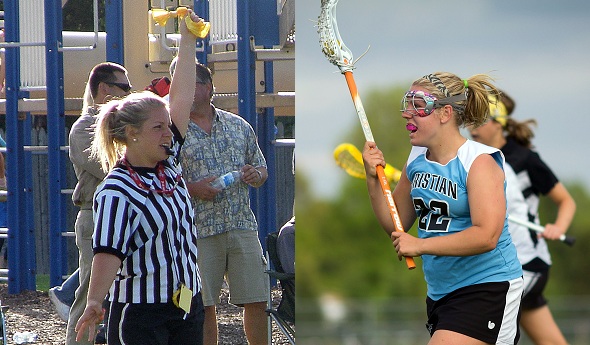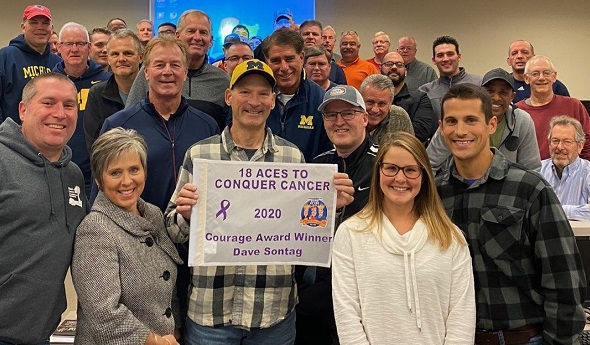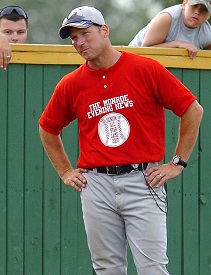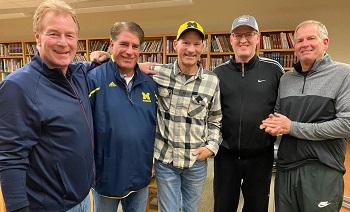
Legacy Program Serves New Officials
By
Rob Kaminski
MHSAA benchmarks editor
October 5, 2012
Implemented 20 years ago by the MHSAA, the Legacy Student Officials Program continues to spawn enthusiastic young officials who are more likely to stay in the family beyond their formative years.
The program pairs high school juniors or seniors with mentors who are already registered MHSAA officials. The one-on-one tutelage serves to introduce, educate and encourage interested students, while upping the odds for retention. Both parties sign a Legacy Pledge form outlining the basic agreement, with one condition being that the students work only subvarsity contests with their mentor or other veteran MHSAA officials.
During the 2011-12 school year, 107 students participated as Legacy officials, bringing the total to 1,156 since 1992. It’s another example of the officiating lineage growing from within and taking care of its own. In many cases, the vets literally are family.
“After graduating high school in the spring of 2006, my father, Rick (an MHSAA registered official for more than 25 years), inspired me to register and work the football season the next fall,” said Chris “C.J.” Jackson. “The worst years of officiating for me were my first two seasons because I couldn’t stand the berating from coaches and fans. I wasn’t good, and everyone picked up on that. My Dad was the only person who kept me in the game. Six seasons later, I find myself going into my second season of college football working as a deep wing official for the Great Lakes Intercollegiate Athletics Conference (GLIAC). This achievement can only be attributed to my dad.”
Also following in Dad’s footsteps are Trevor and Austin Hartley of Lansing, as father, Eric, got them involved at an early age.
“He has helped me on the field, but more importantly off of the field to become a better official in general and a better person,” said Trevor of Eric. “He was responsible for getting me into officiating, but staying in has been a goal from the beginning.”
Trevor’s sentiment is common among the species. Once officiating gets into the bloodstream – whether from immediate family or from a mentor in the extended family – it tends to stay.
Mentors in the Legacy Program take their roles seriously, and spend countless unpaid hours helping their students develop. The finished product is all the compensation they need.
“If it weren’t for my mentor pushing me and telling me I could be a really great official, I never would have kept going this far. I continue to officiate because it is a great opportunity to give back and be a part of something I love with a passion, and that is sports,” said Detroit Martin Luther King grad Kyle Bowen, who first registered in 2008 under the guidance of Detroit’s Darryl Jones.
The basketball official has taken his skills to Grand Rapids, where he attends Grand Valley State University and continues work as an official while discovering its ancillary benefits.
“Being an official has helped me so much in a lot of different aspects in my life,” Bowen said. “I work at Grand Valley as a supervisor in the intramural program. That job entails developing and training new officials so we can produce quality officiating in our program.
 “Darryl showed me how important it is to have tough skin and how to handle adverse situations when they come up and not let them linger. He taught me that officiating is probably one of the best things you could ever do, but it’s not for everyone.”
“Darryl showed me how important it is to have tough skin and how to handle adverse situations when they come up and not let them linger. He taught me that officiating is probably one of the best things you could ever do, but it’s not for everyone.”
Not for everyone, but thanks to a growing list of sports, there are more opportunities to lure potential candidates. When the Legacy Program was launched, competitive cheer and lacrosse were not yet MHSAA-sponsored sports. Cheer hit the tournament scene in 1994, while lacrosse arrived in 2005. As participation in those sports continues to increase, the pool of potential officials expands.
For recent Oakland University graduate Leah DiCristofaro, cheerleading was something she’d enjoyed since the age of 5. Her mother Renee is a veteran official for the Michigan Cheer Judges Association, where Candy Cox also serves as one of the state’s top judges.
“When Leah was a senior in high school (St. Clair Shores Lake Shore), she registered as a Legacy official,” Cox said. “She had a mentor who was with her at every competition during that year. At her first competition, she worried that she would miss something and not credit the teams properly. But, with guidance from her mentor and fellow judges those fears were short-lived.”
DiCristofaro continued to judge during college, but on a limited basis. The fact she took on any assignments at all illustrated her commitment, as she not only was putting up grades worthy of making the national honor roll, but she was a four-year starter for the Grizzlies softball team. As a catcher and designated player, DiCristofaro led the team with a .308 batting average as a sophomore, and tied for the team lead with six homers as a senior last spring.
“She accepted a limited amount of meets, but she kept officiating throughout all four years of college. Last year she filled in several times for officials who cancelled at the last minute,” Cox said.
Across the state, Helen Young experienced a similar childhood centered around athletics. Her parents, Neal and Vicki, coach lacrosse for Grand Rapids Christian schools. Vicki oversees the youth program, 3rd through 12th grades, and coaches the middle school. Neal is the varsity head coach at Christian High School, where Helen excelled and earned numerous honors.
Through her experiences, she also began to help her mother coach the middle school team, and made acquaintances like Nancy Lapekas of the West Michigan Lacrosse Association. Young was hooked.
“Nancy Lapekas has been so helpful in teaching me, assigning me, and supporting me on and off the lacrosse field,” said Young, who last spring earned a $1,000 scholarship from Michigan Lacrosse. “She has kept me going. As a young ref, if she didn't have my back I don't think I would have been able to continue. I love all aspects of the sport. I play, coach, and officiate, and it is nice to see the game from all angles.”
Young is a freshman at Michigan State University, and already plans to have a busy spring, when she’ll be balancing classwork and officiating.
“The most rewarding part of being a younger official is that I get to meet and ref with wonderful role models,” she said. “Some of the greatest people are adults I get to work with on the field. The cool part about my relationship with these other refs is that they are there for me off the field as well.”
That’s the beauty of the Legacy Program. A dedicated mentor sets the wheels in motion and opens a world of possibilities to students dedicated enough to seek advancement. There are no limits to the number of contacts and support groups in the industry.
Luke Bowman is a 2008 Jackson Lumen Christi grad who still leans on mentor Chuck Walters from time to time.
“Chuck has been a huge influence in my officiating career. I am always able to give him a call to bounce rule questions off of, even after I left my hometown being 100 miles away up at Central Michigan University.”
Like all young officials, Bowman soon realized that there were more people like Walters wherever he went; an endless supply of support personnel the further one delves into this avocation.
“The Capital Area Officials Association in Lansing has helped me grow as an official by constantly challenging my skills and abilities,” Bowman said. “Each meeting begins with a closed-book rules quiz to test our knowledge. Why is it closed-book? On Friday nights we can’t bust out the rules book on the field. The tools and resources available to the members range from evaluations at games and scrimmages to working with veteran officials.”
 A couple common threads bond Legacy officials who continue to register with the MHSAA. Many are college-bound, or first officiated at the youth level.
A couple common threads bond Legacy officials who continue to register with the MHSAA. Many are college-bound, or first officiated at the youth level.
Michael Reseigh fits the bill. While playing soccer at Rochester High School, Reseigh officiated local club games for five years. When his playing days were done he set his sights on officiating the high school level and contacted Pat Hayes of the Soccer Referees Association in the spring of 2009.
Now a senior at the University of Michigan, he has been at it ever since, with help from Hayes.
“When I went to college, my availability became limited. I was almost completely unavailable for the boys season in the fall. I was available, however, for the girls season since my semester at college finished at the end of April. I expressed my desire to Pat Hayes that I remain active in the association despite my limited availability. She has been great to me, giving me as many games as possible for the month of May when I come home,” Reseigh said.
Of course, not all in the world of fun and games is, well, fun and games. Young officials will experience all of the pitfalls that come with the uniform; tense moments, nervousness, missed calls and clashes with coaches.
They also have the additional burden of learning mechanics, contest rules and philosophies while working the lowest levels where the most chaotic action and least sympathetic coaches preside. Then, there’s the final hurdle of perception, simply brought on by their youthful appearance. It’s been said by many a veteran official that the least experienced officials have the toughest games to work.
“Some of the challenges I have had are due to my age,” Young said. “I think coaches don't take me seriously, and expect I don't know what I am talking about. If I let it bother me, then I probably wouldn't be able to ref. One time I made a call, and the coach proceeded to scream at me and yell at me and come onto the field. The behavior was even more ridiculous because it was a 5th/6th-grade game! I think that he felt like he could yell at me because I was a young ref.”
Trevor Hartley relates a similar scenario.
“I have had to deal with it since Day One,” Hartley said. “In my first-ever football game, a youth game, a coach was arguing a no-call with me and questioned if I was any older than the 5th and 6th-grade players on the field.”
The participants at that level are far from perfect. Having people understand that is one of the luxuries youth players have and officials don’t. It’sone of the great double-standards of athletics.
“A first-year official doing a 5th-grade football game is expected by coaches, players and fans to look like, act like, talk like, and officiate like a Big Ten football official,” Jackson said. “Yes, every game is important, no matter the level of play, but it is impossible to expect the greatest officials at every level of play.”
Again, this is where the Legacy Program pays dividends, as the young officials are not left on an island. There is support early and often, all the while allowing officials to grow. For those who understand their role in the game, the benefits stretch beyond the fields and gyms.
“I would tell students who are hesitant to take the step and try officiating, as there is really nothing to lose,” said Reseigh.
“I have learned how to manage any type of situation due to officiating. It has taught me respect for the game and all involved with it as well as taking responsibility for my own actions,” Jackson said.
“To younger people who want to officiate I would say, ‘Go for it,’” said Young. “It is such a great experience and it really helped me mature and be confident.”
“In the heat of the moment, you are going to have to effectively communicate with coaches and players in intense conversations,” Bowman said. “These skills will translate to the workplace as well. I directly attribute my success in the workplace to officiating.”
“The best advice I can give is, ‘Just go out there and try it,’” Bowen said. “No one will be perfect and get every call, but if you put your best effort forward then you can do great things.”
Sounds like they’ve been well trained from those before them, and are more than capable of carrying on the officiating legacy.
PHOTOS: (Top) Helen Young, a girls lacrosse official and product of the Legacy program, called youth lacrosse games while also playing on Grand Rapids Christian's varsity. (Middle) Kyle Bowen is a Legacy program and Detroit Martin Luther King grad.
NOTE: This is the second installment in the series "Making – and Answering – the Call" detailing the careers and service of MHSAA officials. Click the link below to view the first.

Sontag Inspires Amid 'Miracle' Cancer Fight
January 3, 2020
By Doug Donnelly
Special for Second Half
PINCKNEY – Dave Sontag could tell something was wrong.
 The gymnasium at Petersburg-Summerfield High School is bigger than most in Monroe County. But when Sontag, a veteran official, was running up and down the floor, he felt unusually tired and began feeling pain in his back.
The gymnasium at Petersburg-Summerfield High School is bigger than most in Monroe County. But when Sontag, a veteran official, was running up and down the floor, he felt unusually tired and began feeling pain in his back.
“I knew something was wrong,” Sontag said. “During a timeout, I told one of the other officials who was in the stands watching that he might have to finish the game.”
Sontag, however, pushed through and made it.
“That’s when it all began,” he said.
A few weeks later, as the Saline varsity baseball coach, Sontag was hitting fly balls to the Hornets’ outfielders.
“I was struggling,” he said. “I called the players in and told them something was wrong. I had to stop.”
Still trying to fight through whatever was wrong, Sontag was coaching third base during a Saline intra-squad scrimmage a short time later.
“I started to see white,” he said.
He had another member of the Saline coaching staff call his wife, Michelle, who came and picked him up and took him to the hospital in Chelsea.
“My blood counts were trash, just trash,” he said. “The doctors said I need to have a blood transfusion.”
He was rushed to a Detroit-area hospital for the transfusion. After tests, Sontag was diagnosed with acute lymphoblastic leukemia, an extremely vigorous, aggressive cancer. That was May 15, 2018.
During the 18 months since, Sontag has gone through chemotherapy and radiation treatments. He’s watched multiple communities respond with fundraisers and benefits and amazing support. He’s had more than one bone marrow transplant. He’s heard from countless friends and ex-players who have continued to lift his spirits day after day via e-mails and text messages. He’s been counted out more than once.
Yet, he’s survived.
“Every day has been a challenge,” he said.
***
Sports and Sontag have gone together from the beginning.
He is a Monroe County native who was The Monroe Evening News Player of the Year in baseball in 1978 and went on to play at the University of Toledo. He taught journalism and English at his alma mater, Monroe Jefferson, before becoming a counselor for another 12 years. He was also the Jefferson director of athletics and recreation for a time.
 He coached baseball for the Bears, leading the team to nearly 400 victories and the Division 2 championship in 2002. He stepped down from coaching to follow his kids, who were playing at higher levels; Ryan Sontag played at Arizona State University and in the Chicago Cubs organization. Susan played softball at Bowling Green State University, and Brendan played ball at Indiana Tech University.
He coached baseball for the Bears, leading the team to nearly 400 victories and the Division 2 championship in 2002. He stepped down from coaching to follow his kids, who were playing at higher levels; Ryan Sontag played at Arizona State University and in the Chicago Cubs organization. Susan played softball at Bowling Green State University, and Brendan played ball at Indiana Tech University.
Still, the desire to coach never left their dad.
“After my kids were done playing, I coached freshman baseball at Jefferson,” he said. “I missed it and still wanted to be part of it.”
With his wife a principal in the Saline district, Sontag was asked by Scott Theisen, Saline’s head coach, to join his staff in 2015. He was with the Hornets when they captured the Division 1 championship in 2017, then was named head coach before the 2018 season started.
“That was the year I got sick,” he said. “I didn’t even finish the year.”
Sontag also has been a basketball official for years, getting his start in the early 1980s. He’s been a registered MHSAA high school basketball official for 40 years and has trained officials for the Monroe County Basketball Officials’ Association. He’s called four MHSAA Finals championship games.
“My first varsity game ever was when I was 21,” Sontag said. “I refereed a game at Whiteford.”
***
Sontag previously battled non-Hodgkin’s lymphoma in 1995-1996, beating that disease after a nine-month battle.
Although this cancer battle began as he was new to the Saline community, they embraced his fight, selling “Team Tags” T-shirts and painting the youth baseball diamond with a big ribbon. His son, Ryan, was invited to throw out the first pitch before the youth baseball season started in Dave’s honor.
Back home, in Monroe County, Sontag’s school held similar fundraisers and blood drives.
“I had so much support,” he said. “It was quite amazing to see.”
He tried all sorts of treatments, ultimately boarding an airplane and heading to Seattle for a clinical trial. It didn’t work.
“At that point, I didn’t think I was going to live,” Sontag said. “They told me there was nothing more they could do. They just were giving me something to take the pain away. I was miserable.”
Still, Sontag said, he held out hope.
“I felt it wasn’t time yet,” he said. “I have three grandkids. There are things I want to do. There’s so much I haven’t accomplished yet. In Seattle, they didn’t count on me living.”
But, for a still-unexplained reason, a combination of the medicine he was given to “take the pain away,” on his flight home and a different medicine he received when he returned to Michigan, started to change the way he felt. His blood counts started getting better.
“The side effects were lousy, but, for some reason, it threw me into remission. They checked for leukemia and it was not there.
“We called it a miracle.”
***
Sontag, who lives in Pinckney now, is still dealing with the side effects of nearly two years of treatments. He has a tingling sensation in his arms and legs – the feeling people get when their hands or feet ‘fall asleep’ – and he has a weak immune system.
 But he gets a little better every day.
But he gets a little better every day.
“Every day is a blessing,” he said.
In addition to the community support and constant praying, he credits his wife with guiding him through this process.
“Michelle has been a rock through all of this,” he said. “She’s been by my side every single day. Without her, I don’t know if I would have made it.”
Recently, the Monroe County Officials’ Association held a banquet during which Sontag was presented with a “Courage Award.” He isn’t sure if he’ll be able to referee again anytime soon.
“I told them that night that I’d like to do it again, somewhere,” he said. “I don’t care of it’s a seventh-grade game. I just want to get out there again.”
In addition to the outpouring of love from multiple communities, family and friends, Sontag said sports has kept him alive.
“Sports is part of my fabric,” he said. “Baseball and officiating basketball games has given me that motivation I’ve needed to fight through this. I don’t know if I will coach again or referee again. I’m definitely not going to jump into the same schedule. But there are things I would like to do.
“Will I become a head coach again? Probably not. The task of being a head coach is probably too big right now. But I’d like to be involved. I’d still like to run camps and clinics. I’d still like to officiate too. I want to be a part of it. It’s something that’s in my blood.”
His son Ryan lives in Saline and has three children. Ryan coaches his son in a youth baseball league.
“He called me the other day and asked if I’d help him out,” Dave Sontag said. “I told him I think he will get me out there at some point.”
 Doug Donnelly has served as a sports and news reporter and city editor over 25 years, writing for the Daily Chief-Union in Upper Sandusky, Ohio from 1992-1995, the Monroe Evening News from 1995-2012 and the Adrian Daily Telegram since 2013. He's also written a book on high school basketball in Monroe County and compiles record books for various schools in southeast Michigan. E-mail him at [email protected] with story ideas for Jackson, Washtenaw, Hillsdale, Lenawee and Monroe counties.
Doug Donnelly has served as a sports and news reporter and city editor over 25 years, writing for the Daily Chief-Union in Upper Sandusky, Ohio from 1992-1995, the Monroe Evening News from 1995-2012 and the Adrian Daily Telegram since 2013. He's also written a book on high school basketball in Monroe County and compiles record books for various schools in southeast Michigan. E-mail him at [email protected] with story ideas for Jackson, Washtenaw, Hillsdale, Lenawee and Monroe counties.
PHOTOS: Longtime official and coach Dave Sontag – standing in front row with wife Michelle, daughter-in-law Amy and son Brendan – is presented a “Courage Award” by the Monroe County Officials Association. (Middle) Sontag, formerly baseball coach at Monroe Jefferson and Saline, mans his spot on the baseline. (Below) Sontag with officials, from left, Mike Gaynier, Mike Bitz, Mike Knabusch and Dan Jukuri. (Top and below photos courtesy of Knabusch; middle photo courtesy of the Monroe News.)

